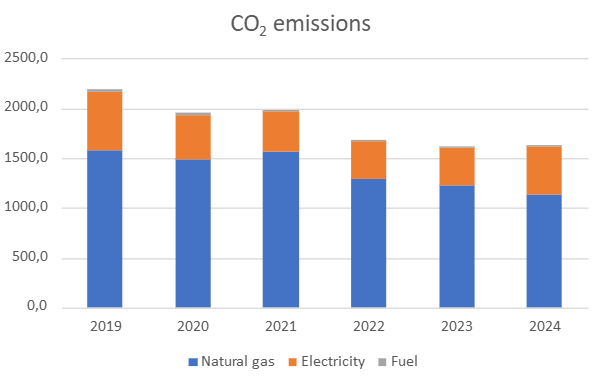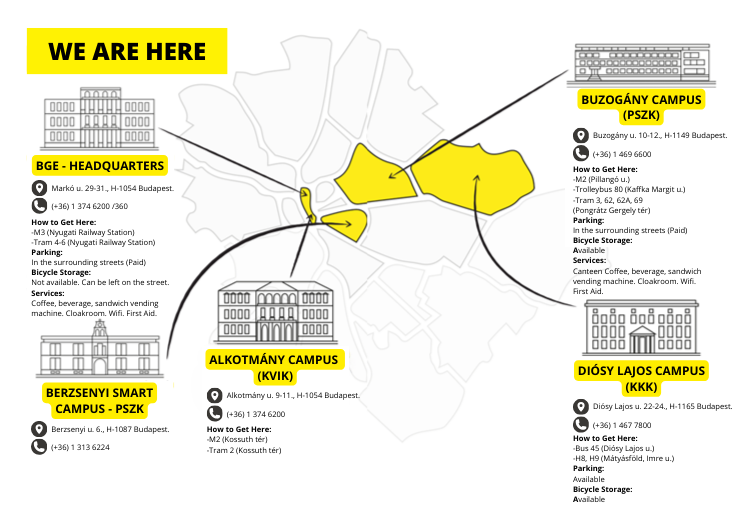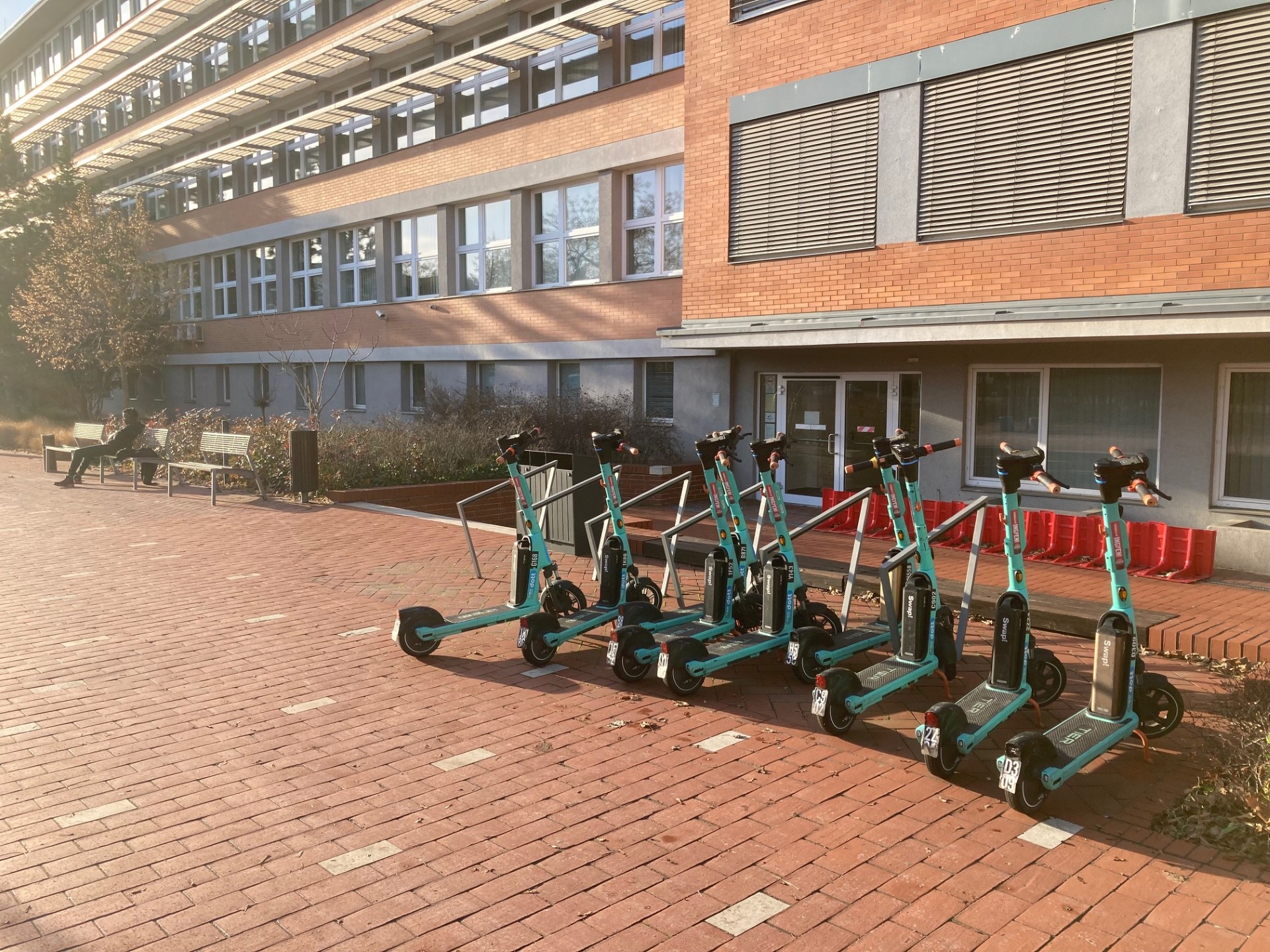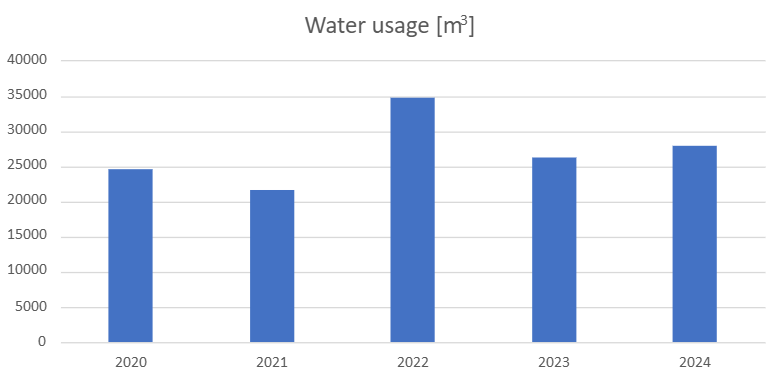We pay special attention to reducing our environmental impacts and preventing harmful effects. We strive to protect our environment through our activities.
As a university committed to responsibility and sustainability, prioritizing the measurement and reduction of our environmental impact is paramount. Over recent years, we have made substantial strides in emission reduction through a series of climate and environmental protection measures.
To establish comprehensive and lasting energy-saving goals, we meticulously calculated the University's carbon footprint and identified potential avenues for emission reduction. The unique infrastructural characteristics of our nine campuses present challenges in implementing standardized energy reduction solutions. Considering this, we must devise individualized solutions tailored to each campus's specific needs. Additionally, investing in improvements is further complicated by the historical designation of many of our buildings, limiting the scope for energy efficiency enhancements.
In terms of emissions, our concerted efforts yielded a noteworthy 21% reduction in 2023 compared to 2020, a testament to the efficacy of our year-end energy savings action plan.
Scope1 Emissions
Our Scope 1 emissions primarily emanate from two key sources: the utilization of natural gas for heating our buildings and the fuel consumption of our university-owned vehicle fleet.
Currently, our vehicle fleet consists of 14 vehicles, with half of them being electrically powered—a strategic move towards sustainability. In recent years, our commitment to reducing environmental impact has been evident through initiatives such as minimizing travel distances and transitioning to a greener fleet. These efforts have resulted in a notable accomplishment: a nearly 50% reduction in emissions originating from fuel consumption. This progress underscores our dedication to sustainable practices and environmental responsibility.
Scope2 Emissions
Our Scope 2 emissions are solely attributed to electricity consumption. A positive outcome of the digital solutions implemented during the COVID-19 period is a substantial reduction in our electricity consumption. These measures have not only enhanced efficiency but have also contributed significantly to minimizing our environmental footprint. Our commitment to embracing sustainable practices remains steadfast as we strive to further improve our energy efficiency and reduce our overall impact on the environment.
Renewable energy
Whenever architectural and heritage preservation considerations allow, we actively implement renewable energy-producing solutions. The integration of solar panels has been a notable initiative, contributing to our commitment to sustainability. To date, these solar panels have generated a substantial 800 MWh of green energy and 10% of our consumption covered by our own electricity production. This achievement underscores our dedication to harnessing environmentally friendly practices and reducing our carbon footprint through the adoption of renewable energy solutions.
You can track our solar panel production online at:
Faculty of International Management and Business
Faculty of Finance and Accountancy
Faculty of Finance and Accountancy Building E
Lengyel Gyula Hall of Residence
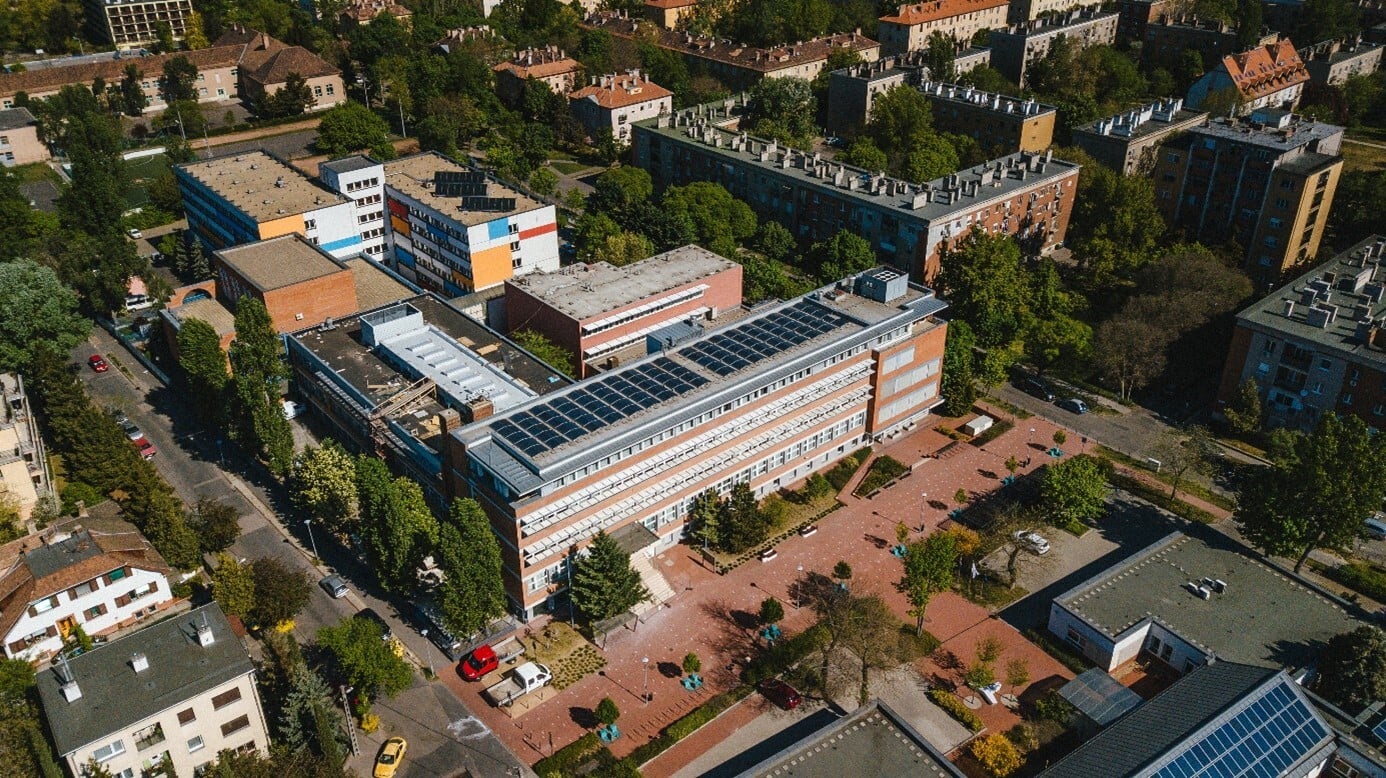
EMS
In 2023, we ushered in a cutting-edge energy management system designed to meticulously record and analyze our time-series energy consumption across various sites and measurement points. This sophisticated system empowers us to discern potential reduction opportunities within our consumption profile. Through data-driven insights, we aim to continually enhance our energy efficiency, identify areas for improvement, and further align our practices with sustainable and responsible energy consumption.
Energy efficiency
In 2022, in light of the prevailing global challenges in energy consumption, procurement, and costs, our University proactively formulated a medium and long-term energy renovation concept for its buildings.
The primary objective was to devise detailed planning programs for energy-efficient renovation tailored to individual buildings. The overarching goal was to ensure the sustainable operation of University buildings while maximizing independence from fossil fuels.
Conducting a thorough energy audit of our building stock, we crafted development proposals categorized into three groups, with the potential for immediate, short-term (within one year), and long-term impact on reducing energy consumption. The implementation of these proposals is projected to result in a nearly one-third reduction in both energy consumption and carbon dioxide emissions. This strategic initiative underscores our commitment to sustainable and responsible energy practices in response to the evolving global energy landscape.
Operating across nine campuses, the University acknowledges the significant emissions generated by travel between these locations. In response, we have put forth several proposals to encourage university citizens to adopt practices that mitigate these emissions. Notably, our campuses are strategically located with convenient access to public transport, with most situated near metro lines.
A substantial portion of our students and staff opt for eco-friendly commuting solutions, predominantly relying on public transport to reach the campuses and their workplaces. The accessibility of the public transport network, coupled with the presence of numerous stations supporting bicycles and micromobility near our campuses, further facilitates sustainable commuting options for our university community. This collective effort underscores our commitment to reducing environmental impact and fostering a culture of responsible transportation.
The university vehicle fleet consists of 14 cars, half of which are electrically powered, contributing to the reduction of environmental impact. Additionally, by greening the fleet, our greenhouse gas emissions have decreased by almost half.
Teleworking
The introduction of teleworking during the COVID-19 period has proven to be a valuable strategy in further reducing emissions from travel. Actively encouraging and supporting our employees in adopting remote work practices wherever feasible has been a key initiative.
By facilitating and promoting telecommuting, we not only contribute to the reduction of carbon emissions associated with daily commuting but also embrace a flexible and sustainable approach to work. This commitment aligns with our ongoing efforts to minimize our environmental footprint and foster responsible practices in response to evolving global challenges.
Public Transportation
We support sustainable and public transportation access to our university. We pay special attention to ensuring that our off-site events are easily accessible by public transportation.
With nine campuses serving 20,000 students and nearly 800 employees, the University is mindful of the significant waste generated within its community. While the waste processing service provider may not provide precise data on the quantity of waste, we gauge its magnitude based on contracted amounts. Our experience suggests that the collected waste often falls below the contracted quantity. Nevertheless, considering the distinct nature of academic periods and breaks, we remain committed to ensuring proper waste management throughout the year, accounting for variations in waste distribution.
In line with our commitment to sustainability, we offer selective waste collection options across all our buildings. We actively encourage members of the university community to participate in waste reduction initiatives and engage in proper sorting practices. This collective effort aims to foster a culture of responsible waste management within our diverse academic environment.
Distribution of waste
A notable portion of our waste at the University is derived from municipal sources, highlighting the varied nature of the materials we handle. However, electronic and hazardous waste constitutes a minimal proportion of our overall waste output. To ensure the proper and responsible management of these specific waste streams, we have established effective partnerships with service providers specializing in the handling and disposal of electronic and hazardous waste. This strategic approach reflects our commitment to managing waste streams with precision, emphasizing sustainability and environmental responsibility across diverse waste categories.
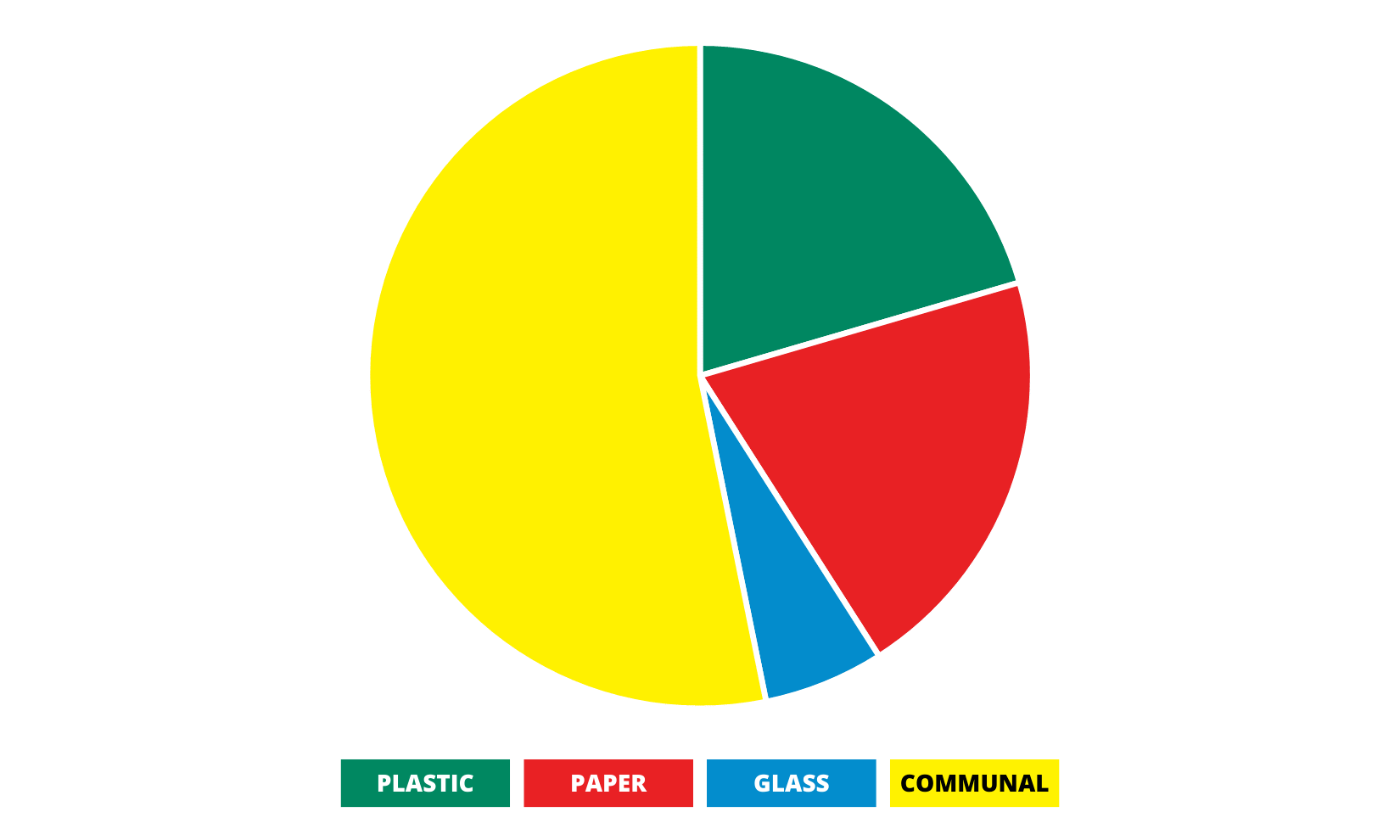
Composting
Responding to a student-led initiative, the Faculty of International Management's dormitory has implemented a composting system to actively promote sustainable practices. The system incorporates separate compostable waste bins on each floor of the dormitory, with regular collection and deposition of their contents into a dedicated compost bin.
The resulting compost, a product of this environmentally conscious initiative, has been utilized in collaboration with nearby kindergartens. The compost is employed for planting in the dormitory courtyard, creating a cyclical and eco-friendly approach that not only reduces waste but also contributes to the local community. This inspiring collaboration reflects the University's commitment to fostering student-led sustainability projects and creating tangible positive impacts in our immediate surroundings.
At the University, water is primarily used for communal purposes, with no industrial use.
Despite the implementation of various water-saving measures, our water consumption has experienced a notable increase, primarily attributed to a significant pipe break in 2022. To mitigate such incidents, we have enhanced the frequency of water consumption monitoring, allowing us to respond promptly to any spikes in usage.
In the downtown area, our buildings lack the opportunity for water retention or rainwater collection. However, in suburban environments, buildings with gardens benefit from substantial water retention capacity. This feature plays a crucial role in preventing drainage issues and facilitates on-site retention of precipitation.
Wastewater originates solely from communal sources, and its treatment is entrusted to a service provider, as on-site wastewater treatment is deemed technically unfeasible. As we continue to address water management challenges, we remain committed to optimizing our strategies and infrastructure to ensure sustainable water practices across our diverse campuses.
Refills
We’ve made refilling your water bottles even easier by installing new, raised water taps on our City and Zugló campuses. These are specifically designed to comfortably fit almost any water bottle, so everyone can quickly and easily access fresh water at any time of day.
